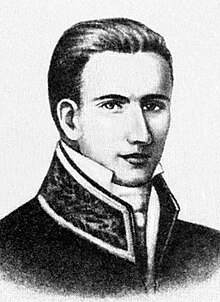Levko Borovykovsky

Levko Borovykovsky ([Borovykovs'kyj] (22 February 1806 – 26 December 1889 in Myliushky village, Poltava Governorate, Russian Empire) was a Ukrainian romantic poet, writer, translator, and folklorist.
After graduating in 1830 from Kharkiv University, Borovykovsky taught in a Kursk gymnasium and from 1839 in the Poltava Institute for Daughters of the Nobility. In 1852 he became a gymnasium inspector in Poltava gubernia and retired a few years later. His works were first published in 1828, and he was one of the first poets of the Kharkiv Romantic School.[1]
Of his numerous poems, the most notable is the ballad Marusia (1829),[2] an adaptation of Gottfried August Bürger's ballad Lenore (1796) and reminiscent of Vasilii Zhukovsky's Svetlana (1813). Levko Borovykovsky successfully nationalised the Gothic-Romantic theme of Marusia, enriching its plot with elements of Ukrainian ethnography,[3] including folklore.[4]
During his lifetime only one collection of his writings was published, Baiky i Prybaiutky [Fables and Sayings] (1852), which brought him recognition as a storyteller. He also translated the poetry of Horace, Aleksandr Pushkin,[5] and Adam Mickiewicz,[6] compiled a Ukrainian dictionary, and collected Ukrainian folklore.[4]
References
[edit]- ^ Subtelny, Orest (2000). Ukraine: A History - 3rd Edition. University of Toronto Press. p. 231. ISBN 9780802083906.
- ^ Wilczyński, Włodzimierz (2004). Leksykon kultury ukraińskiej. Universitas. p. 30. ISBN 9788324202027.
- ^ Krys, Svitlana (2016) ‘Book Review: Liudmyla Starytska-Cherniakhivska, The Living Grave: A Ukrainian Legend and Klym Polishchuk, Treasure of the Ages: Ukrainian Legends’, EWJUS: East/West: Journal of Ukrainian Studies, Vol 3, No 2, pp. 213-215.
- ^ a b Levko Borovykovsky Internet Encyclopedia of Ukraine. University of Toronto
- ^ Kubiĭovych, Volodymyr; Danylo Husar Struk (1993). Encyclopedia of Ukraine, Volume 4. University of Toronto Press. p. 283. ISBN 9780802030092.
- ^ Lednicki, Wacław (1976). Adam Mickiewicz in world literature. Greenwood Press. p. 412. ISBN 9780837187655.
